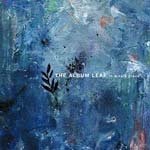
The Album Leaf In A Safe Place
(City Slang)
Is it possible that modesty is becoming an adjunct of cool, or is that just wishful thinking? There are still, obviously, powerful forces at play urging us to acquiesce to the irresistible charisma of the solo ego - to listen to the Norahs, the Daniels, the Robbies, simply because there is only one of them (even if, in most cases, one is one too many by a long shot). But there are cunning counterforces at work subverting all that, and requiring that we actually do a little work ourselves to discover that Gravenhurst is actually a Nick, Badly Drawn Boy a Damon, and Lali Puna a Valerie. It's that shift from the definite to the indefinite article that makes it cool, even if it isn't, if you see what I mean.
The Album Leaf is a famously modest fellow. His background (after a classical piano education - he named himself after a Chopin piece) in the San Diego hardcore scene is fairly eclectic: from the noise punk of The Locust and the beat-driven Gogogo Airheart to the ambient piano-rock of Tristeza and the epic core of Black Heart Procession. However, since the emergence of his solo project as The Album Leaf with 1999's An Orchestrated Rise to Fall, he's been busy ploughing a particular furrow of fairly cheery introspective Eno-descended instrumental/ambient stuff that's been pleasantly chilled if not exceptionally inspired.
He's one of those dark horses of the industry who thrives on collaboration and who everyone seems to like. This is usually a recipe for a stalled career as a wilting wallflower - always support, never headline - but he's managed decisively to buck that in this, his third full-length album, which announces, quite unequivocally, like an eighties film poster, that The Album Leaf is Jimmy Lavalle.
It doesn't happen immediately. The album's opening is an engaging mix of attenuated songlines and beats that flirts with kitsch whilst managing - just - to avoid it. There is singing - a first for The Album Leaf: On Your Way is a nicely unsentimental duo with long-standing Black Heart Procession buddy Pall Jenkins. There is a smattering of exquisitely sparse cello accompaniment from ex-Múm Gyda Valtysdóttir. And there are some unavoidably Sigur Rósian moments (not surprising given that the album was recorded in Sigur Rós' Sundlaugin studio at their invitation, and that they act as his backing band, virtually, throughout), but then, halfway through, and five tracks in, it happens. As soon as track 6 - Over the Pond - begins (sung in Hopelandic - the nonsense language invented by Jónsi Birgisson of SR) it's clear that something's shifted, a gate has opened, a transition occurred (and the heavens were rent by a great mixing of metaphors). It's a wonderfully strange, nervy, disturbingly beautiful song - the sonic equivalent of settling down to your first plate of raw sliced blowfish - and it's quite unlike anything you've heard before. Goodbye, it seems to be saying, to Jimmy the average-to-good crafter of pleasant background chillout stuff, and hello to Jimmy the risk-taker, the reacher for the stars, the mature artist. And so it goes on. A second half laden with the fruits of this ripening moment.
It was always going to be a little unlikely that someone steeped in the sun 'n' surf culture of Southern California was going to get totally melancholy overnight, but this Icelandic association seems to have triggered a benign crisis in Jimmy Lavalle's composition gland and stimulated his transformation from a major key minor artist to a minor key major artist in the course of this one volume. After a curiously inaudible (until you crank up the volume to ten) hidden track that's all bottle-slide guitar and oh how I loved you but I had to let you go (which might be a cover - help me out here), remember to turn the volume right down again for a final brief burst of chaotic left-the-tape-running studio banter which ends, perfectly, on Jimmy's own typically laconic, properly self-confident "It felt right."
11 September, 2004 - 23:00 — Paul Roylance